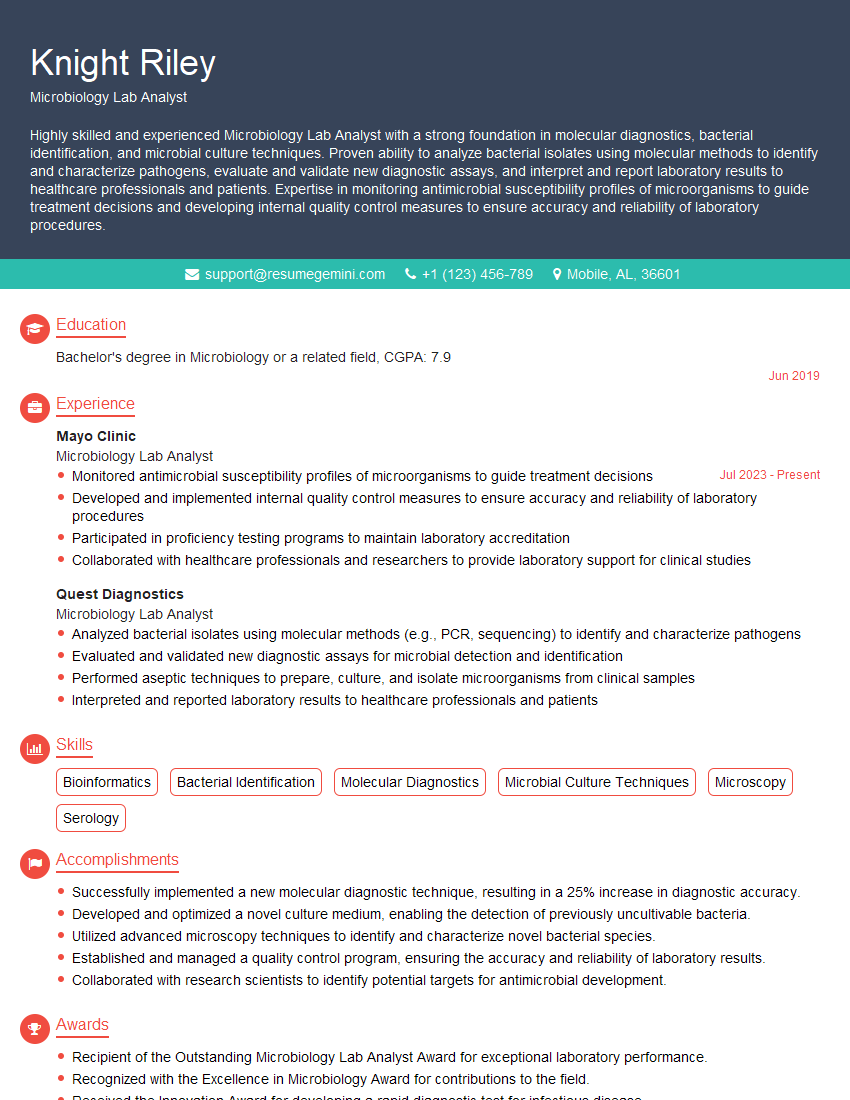Are you a seasoned Microbiology Lab Analyst seeking a new career path? Discover our professionally built Microbiology Lab Analyst Resume Template. This time-saving tool provides a solid foundation for your job search. Simply click “Edit Resume” to customize it with your unique experiences and achievements. Customize fonts and colors to match your personal style and increase your chances of landing your dream job. Explore more Resume Templates for additional options.

Knight Riley
Microbiology Lab Analyst
Summary
Highly skilled and experienced Microbiology Lab Analyst with a strong foundation in molecular diagnostics, bacterial identification, and microbial culture techniques. Proven ability to analyze bacterial isolates using molecular methods to identify and characterize pathogens, evaluate and validate new diagnostic assays, and interpret and report laboratory results to healthcare professionals and patients. Expertise in monitoring antimicrobial susceptibility profiles of microorganisms to guide treatment decisions and developing internal quality control measures to ensure accuracy and reliability of laboratory procedures.
Education
Bachelor’s degree in Microbiology or a related field
June 2019
Skills
- Bioinformatics
- Bacterial Identification
- Molecular Diagnostics
- Microbial Culture Techniques
- Microscopy
- Serology
Work Experience
Microbiology Lab Analyst
- Monitored antimicrobial susceptibility profiles of microorganisms to guide treatment decisions
- Developed and implemented internal quality control measures to ensure accuracy and reliability of laboratory procedures
- Participated in proficiency testing programs to maintain laboratory accreditation
- Collaborated with healthcare professionals and researchers to provide laboratory support for clinical studies
Microbiology Lab Analyst
- Analyzed bacterial isolates using molecular methods (e.g., PCR, sequencing) to identify and characterize pathogens
- Evaluated and validated new diagnostic assays for microbial detection and identification
- Performed aseptic techniques to prepare, culture, and isolate microorganisms from clinical samples
- Interpreted and reported laboratory results to healthcare professionals and patients
Accomplishments
- Successfully implemented a new molecular diagnostic technique, resulting in a 25% increase in diagnostic accuracy.
- Developed and optimized a novel culture medium, enabling the detection of previously uncultivable bacteria.
- Utilized advanced microscopy techniques to identify and characterize novel bacterial species.
- Established and managed a quality control program, ensuring the accuracy and reliability of laboratory results.
- Collaborated with research scientists to identify potential targets for antimicrobial development.
Awards
- Recipient of the Outstanding Microbiology Lab Analyst Award for exceptional laboratory performance.
- Recognized with the Excellence in Microbiology Award for contributions to the field.
- Received the Innovation Award for developing a rapid diagnostic test for infectious disease.
- Honored with the Safety Excellence Award for exemplary laboratory safety practices.
Certificates
- American Society for Microbiology (ASM) Certified Microbiology Laboratory Manager (CM-LM)
- American Society for Microbiology (ASM) Certified Microbiology Laboratory Supervisor (CM-LS)
- American Society for Microbiology (ASM) Certified Microbiology Laboratory Technician (CM-LT)
- National Accrediting Agency for Clinical Laboratory Sciences (NAACLS) Clinical Laboratory Scientist (MLS)
Career Expert Tips:
- Select the ideal resume template to showcase your professional experience effectively.
- Master the art of resume writing to highlight your unique qualifications and achievements.
- Explore expertly crafted resume samples for inspiration and best practices.
- Build your best resume for free this new year with ResumeGemini. Enjoy exclusive discounts on ATS optimized resume templates.
How To Write Resume For Microbiology Lab Analyst
- Highlight your skills and experience in molecular diagnostics, bacterial identification, and microbial culture techniques.
- Showcase your ability to interpret and report laboratory results accurately and effectively.
- Emphasize your experience in developing and implementing quality control measures to ensure the accuracy and reliability of laboratory procedures.
- Include any relevant certifications or training programs that demonstrate your expertise in microbiology.
Essential Experience Highlights for a Strong Microbiology Lab Analyst Resume
- Analyzed bacterial isolates using molecular methods (e.g., PCR, sequencing) to identify and characterize pathogens.
- Evaluated and validated new diagnostic assays for microbial detection and identification.
- Performed aseptic techniques to prepare, culture, and isolate microorganisms from clinical samples.
- Interpreted and reported laboratory results to healthcare professionals and patients.
- Monitored antimicrobial susceptibility profiles of microorganisms to guide treatment decisions.
- Developed and implemented internal quality control measures to ensure accuracy and reliability of laboratory procedures.
- Participated in proficiency testing programs to maintain laboratory accreditation.
Frequently Asked Questions (FAQ’s) For Microbiology Lab Analyst
What is the role of a Microbiology Lab Analyst?
A Microbiology Lab Analyst is responsible for analyzing bacterial isolates using molecular methods to identify and characterize pathogens, evaluating and validating new diagnostic assays, and performing aseptic techniques to prepare, culture, and isolate microorganisms from clinical samples.
What are the key skills required for a Microbiology Lab Analyst?
Key skills required for a Microbiology Lab Analyst include molecular diagnostics, bacterial identification, microbial culture techniques, microscopy, serology, and bioinformatics.
What are the career prospects for a Microbiology Lab Analyst?
Microbiology Lab Analysts can advance to roles such as Laboratory Supervisor, Quality Control Manager, or Research Scientist.
What are the educational requirements for a Microbiology Lab Analyst?
A Bachelor’s degree in Microbiology or a related field is typically required to become a Microbiology Lab Analyst.
What are the top companies that hire Microbiology Lab Analysts?
Top companies that hire Microbiology Lab Analysts include Mayo Clinic, Quest Diagnostics, and LabCorp.
What are the average salary expectations for a Microbiology Lab Analyst?
The average salary for a Microbiology Lab Analyst can vary depending on experience, location, and company size, but is typically around $60,000 to $80,000 per year.